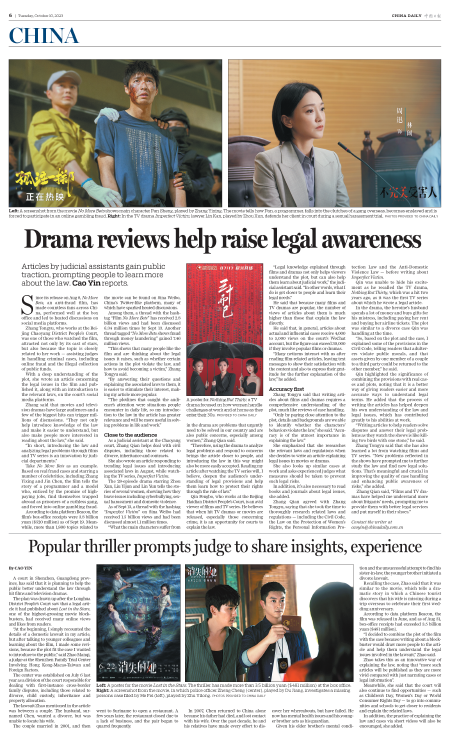
Left: A poster for the movie Lost in the Stars. The thriller has made more than 3.5 billion yuan ($481 million) at the box office. Right: A screenshot from the movie, in which police officer Zheng Cheng (center), played by Du Jiang, investigates a missing persons case filed by He Fei (left), played by Zhu Yilong.
A court in Shenzhen, Guangdong province, has said that it is planning to help the public better understand the law through hit films and television dramas.
The plan was drawn up after the Longhua District People's Court saw that a legal article it had published about Lost in the Stars, one of the highest-grossing movie blockbusters, had received many online views and likes from readers.
"At the beginning, I simply recounted the details of a domestic lawsuit in my article, but after talking to younger colleagues and learning about the film, I made some revisions, because the plot fit the case I wanted to introduce to the public," said Zhao Manqi, a judge at the Shenzhen Family Trial Center Involving Hong Kong-Macao-Taiwan and Foreign Factors.
The center was established on July 6 last year as a division of the court responsible for dealing with first-instance cross-border family disputes, including those related to divorce, child custody, inheritance and property allocation.
The lawsuit Zhao mentioned in the article was between a couple. The husband, surnamed Chen, wanted a divorce, but was unable to locate his wife.
The couple married in 2001, and then went to Suriname to open a restaurant. A few years later, the restaurant closed due to a lack of business, and the pair began to quarrel frequently.
In 2007, Chen returned to China alone because his father had died, and lost contact with his wife. Over the past decade, he and his relatives have made every effort to discover her whereabouts, but have failed. He now has mental health issues and his younger brother acts as his guardian.
Given his elder brother's mental condition and the unsuccessful attempt to find his sister-in-law, the younger brother initiated a divorce lawsuit.
Recalling the case, Zhao said that it was similar to the movie, which tells a dramatic story in which a Chinese tourist discovers that his wife is missing during a trip overseas to celebrate their first wedding anniversary.
According to data platform Beacon, the film was released in June, and as of Aug 31, box-office receipts had exceeded 3.5 billion yuan ($481 million).
"I decided to combine the plot of the film with the case because writing about a blockbuster would draw more people to the article and help them understand the legal issues involved in the lawsuit," Zhao said.
Zhao takes this as an innovative way of explaining the law, noting that "more such articles will be published as they are more vivid compared with just narrating cases or legal information".
Meanwhile, she said that the court will also continue to find opportunities — such as Children's Day, Women's Day or World Consumer Rights Day — to go into communities and schools to get closer to residents and explain the related laws.
In addition, the practice of explaining the law and cases via short videos will also be encouraged, she added.

